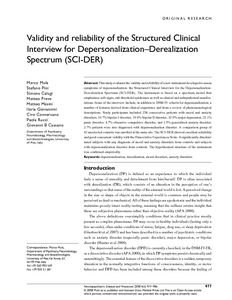Mula, M; Pini, S; Calugi, S; Preve, M; Masini, M; Giovannini, I; Conversano, C; Rucci, P; Cassano, GB
(2008)
Validity and reliability of the Structured Clinical Interview for Depersonalization-Derealization Spectrum (SCI-DER).
Neuropsychiatric Disease and Treatment, 4 (5).
pp. 977-986.
ISSN 1176-6328
https://doi.org/10.2147/NDT.S3622
SGUL Authors: Mula, Marco
![[img]](https://openaccess.sgul.ac.uk/107342/1.hassmallThumbnailVersion/Validity_reliability_of_structured_clinical_interview_depersonalization_derealization_spectrum.pdf)  Preview |
|
["document_typename_application/pdf; charset=binary" not defined]
Published Version
Download (92kB)
| Preview
|
Abstract
This study evaluates the validity and reliability of a new instrument developed to assess symptoms of depresonalization: the Structured Clinical Interview for the Depersonalization-Derealization Spectrum (SCI-DER). The instrument is based on a spectrum model that emphasizes soft-signs, sub-threshold syndromes as well as clinical and subsyndromal manifestations. Items of the interview include, in addition to DSM-IV criteria for depersonalization, a number of features derived from clinical experience and from a review of phenomenological descriptions. Study participants included 258 consecutive patients with mood and anxiety disorders, 16.7% bipolar I disorder, 18.6% bipolar II disorder, 32.9% major depression, 22.1% panic disorder, 4.7% obsessive compulsive disorder, and 1.5% generalized anxiety disorder; 2.7% patients were also diagnosed with depersonalization disorder. A comparison group of 42 unselected controls was enrolled at the same site. The SCI-DER showed excellent reliability and good concurrent validity with the Dissociative Experiences Scale. It significantly discriminated subjects with any diagnosis of mood and anxiety disorders from controls and subjects with depersonalization disorder from controls. The hypothesized structure of the instrument was confirmed empirically.
Statistics
Item downloaded times since 27 Feb 2015.
Actions (login required)
 |
Edit Item |



